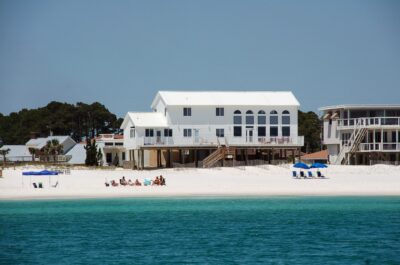Recurrence of party house issues are bad for everyone’s business, and 2022 will see meaningful enforcement, more proactive vetting to restrict bookings by poorly-reviewed guests, and more technological advancements beyond Google Home, Next, Noise Aware, etc. to significantly minimize this phenomenon.
The short-term rental (STR) market, already a growing market prior to 2020, took off in bold new directions during the pandemic, becoming the go-to accommodation type for travelers. And during these past few years, the duration and nature of personal travel changed considerably, with families, individuals, friends and small groups deciding to decamp for longer periods of time in an STR, often working and vacationing in one fell swoop for weeks or months at a time. Significantly, the destinations that became most desirable during COVID-19 were remote areas, preferably accessible by car or RV.
Previously overlooked areas were beset with tourists looking, on average, not for hotels but for their own space to control and feel safe. Much like their bigger city counterparts, these towns have embarked on the path of finding balance between the positive aspects of a new tourist economy and inevitable dustups that ensue in communities with STRs and neighboring full-time residents. Work has been done to bridge differences in areas like Maui County, where leading STR marketplaces have provided assistance in helping to enforce vacation rental laws – but a true playbook or template for success in popular tourist locations is still somewhere on the horizon.
With this background in mind, we’ll take a holistic and reasoned view of STR issues that provides a much more interconnected picture. Residents of various communities across the country have complained that STRs are impacting the nature of their community and causing a shortage of affordable housing. However, this perception does not take into account the broader scope of what needs to be considered.
What Happens When STR Homes are Banned or Curtailed?
Tourism impact – It’s simple math – a decrease in available lodging causes a decrease in tourism. In the absence of available accommodations that are conducive to the type of vacation a family wants to have, they simply won’t travel to the destination. While cities like Brevard, North Carolina specifically gave the green light to short-term rentals to attract more tourists, bolster attendance at local events and give a boost to retailers, many other cities are making hasty decisions to pull back without fully considering the implications of banning or severely curtailing STRs, including all factors associated with declining tourism.
Municipal coffers – Fewer STRs in a community means decreased lodging tax remitted to the local government, which in turn decreases available revenue that jurisdictions need to support services they provide. This includes everything from marriage licenses to road maintenance to other infrastructure maintenance such as traffic lights, internet access, etc. This lost revenue must be made up in some way, and typically jurisdictions will seek to recoup their lost lodging tax revenue through increased sales tax, increased property taxes, hikes in the cost of city services, etc. This puts the burden of replacing lost STR tax revenue on year-round residents – suddenly it’s now more expensive to live in the community. This may exacerbate an affordable housing issue.
Local retailers – Reduced short-term rentals equals fewer tourists year-round, who would otherwise be frequenting local restaurants, bars, coffee shops, grocery stores, fitness centers and yoga studios, spa services, you name it. Retailers lose revenue, which leads to cost-cutting, including reducing full- and part-time clerks and other customer-facing personnel. This decreases the job market for people living in the community, potentially prompting them to move elsewhere in search of work. It’s important for cities experiencing STR skirmishes to look at the potential for a downward spiral of loss to the retail economy.
STR-focused businesses – Any local business that directly serves STRs is impacted, from house cleaners and landscaping businesses to property managers, pool services, electricians, pest control services, plumbers, caterers, bicycle rental businesses, and many others. Consider especially the STR ecosystem of businesses in smaller towns with newfound booms in short-term guests, experiencing for the first time a robust micro-economy dependent on ongoing STR stays. In the event of a pullback, the ripple effect is undeniable and should be included on the “debit/credit” list of any town looking to curtail or ban STRs.
The “Affordability Gap” is a Marquee Argument
There’s been much recent discussion of the purported impacts of STRs on affordable housing. The affordability gap argument is now front and center in many cities across the U.S. One of the primary issues put forth is the “transient” nature of short-term renters, fractionally occupying housing that could be utilized by local workers.
But what actually happens when you ban STRs, as happened recently in Rancho Mirage, Calif., and change a shorter-term rental into a long-term rental? Will those newly available long-term rental homes be within financial reach for the average retail clerk, waitstaff, or lift line attendant? If not, these houses may be rented by larger groups of these workers. Will that add to the appeal of their neighborhood as envisioned by STR opponents, and is there a general understanding that home occupants in this category are also relatively transient? Many of these renters may work off hours and work multiple jobs, leading to regular traffic in and out of the house at all hours. Multiple renters often means multiple vehicles stacked or scattered in driveways, in front of neighboring homes or even parked on front lawns.
These impacts on a neighborhood are self-explanatory, and in line with the perceived or real impact of guests renting a home via Airbnb, Vrbo, Vacasa or other platform. This is to acknowledge that affordable housing is a real issue in many tourism-based communities, but limiting the lodging options for tourists, and prompting a negative impact on the local economy, is hardly the answer.
A recent, and surprising, Harvard Business Review study found that cities that curb STRs negatively affect development, while cities with a robust STR market are more likely to have upgraded housing development and faster growth. For example, municipalities could consider measures including a fee or tax for STRs earmarked specifically for creating affordable housing. Or, as was done in Crested Butte, CO, where city residents voted to increase the short-term rental tax to fund local housing initiatives.
These are practical, actionable solutions that have the potential to positively address a specific issue and contribute to stabilizing the local economy over time.
Party Houses Grab Headlines
Far and away the top concern and complaint regarding STRs in established residential neighborhoods is the “party house” phenomenon, with unconcerned revelers staying in a home for a few nights and causing mayhem at all hours. Many news stories around STR issues either focus exclusively on or delve heavily into party house issues.
Individuals who own STRs don’t want their home to ever enter this category. It’s a net negative for business, and equates with being a bad neighbor and bad actor. The STR platforms also have a big stake in curbing party houses. Late last year, Airbnb went to great lengths to short-stop bad behavior around New Year’s Eve with strict measures, including:
- preventing guests with no Airbnb positive review history from making three-night reservations for an entire home (the platform has previously banned guests from booking just a single night)
- implementing tighter restrictions on two-night reservations that it believed could result in disruptive events
The bottom line is, recurrence of party house issues are bad for everyone’s business, and 2022 will see meaningful enforcement, more proactive vetting to restrict bookings by poorly-reviewed guests, and more technological advancements beyond Google Home, Next, Noise Aware, etc. to significantly minimize this phenomenon.
Communication and Compliance are Key to Future STR Success
Restricting STRs can have a significant impact on communities. The sudden reduction of tourists causes a ripple effect across local economies, reducing essential lodging tax revenue and impacting sales tax revenue. Yet municipalities continue to take abrupt action against STRs as a result of full-time resident complaints against noise and other behaviors that lack courtesy. Eventually, jurisdictions will need to analyze the financial impact STRs have on their overall budgets and local economy.
The coming “professionalization” of STR hosts and property managers is inevitable, and essential to forging a new era of rigorous compliance in popular and emerging vacation areas. A thorough analysis of short-term lodging skirmishes across the country points consistently to a lack of compliance by owners, managers, and certainly guests. Complaints to police departments and other authorities result in snap decisions by city councils that result in lost or reduced lodging tax revenues, and economic harm to businesses and local employees.
This year we’ll see more actions similar to Encinitas, Calif., which recently approved STR amendments to address concerns such as STR occupancy limits, neighborhood disruption, and parking and garbage issues. These and similar actions will portend coming solutions for what has to-date been an either/or proposition of “stay or go” for STRs. Keep an eye out for intelligent applications of technology to get out ahead of STR scofflaws (guests and hosts), ensure collection and remittance of lodging tax on all short-term properties, and provide local and regional analytics to help municipalities and other stakeholders craft an enduring STR economy that coexists successfully with full-time residents.
Pam Knudsen is an executive at Avalara, leading multi-tax teams including Lodging, Beverage Alcohol, Telecommunications and Sales & Use Tax. She serves as a leading voice in vacation rental tax compliance and regulation, in addition to bringing in-depth experience across software/SaaS technology as well as ERP systems. Pam joined Avalara in 2012.






















































































































































































